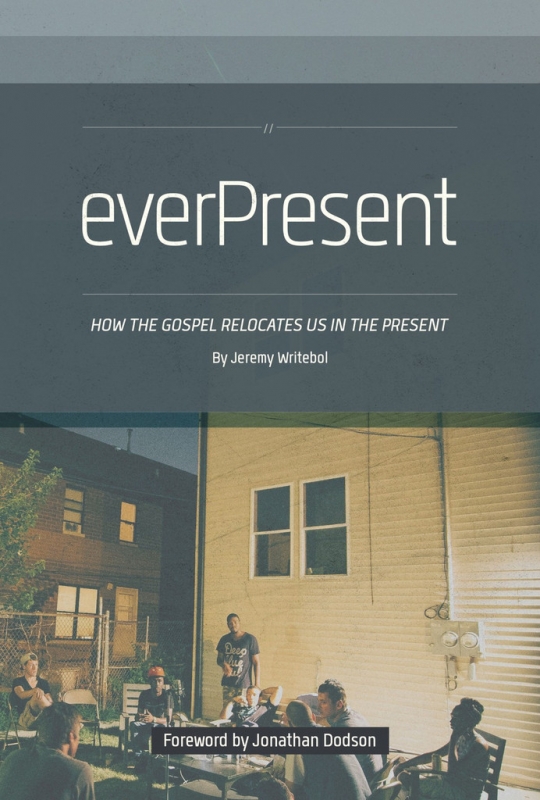 Be committed to Jesus wherever you are! That’s how I would summarize Jeremy Writebol’s wonderful book called everPresent. Writebol’s goal is to “help you see how being present in the everyday places we inhabit is missional living” (17). He also purposes to help the reader “understand God more fully so you will live as his people more faithfully” while also bringing “the technique of disciple-making down a few notches to show you how God equips everyday, ordinary people to be his “sent ones” as they live their lives in the presence of unbelievers” (17).
Be committed to Jesus wherever you are! That’s how I would summarize Jeremy Writebol’s wonderful book called everPresent. Writebol’s goal is to “help you see how being present in the everyday places we inhabit is missional living” (17). He also purposes to help the reader “understand God more fully so you will live as his people more faithfully” while also bringing “the technique of disciple-making down a few notches to show you how God equips everyday, ordinary people to be his “sent ones” as they live their lives in the presence of unbelievers” (17).
In the first half of the book, Writebol lays the theological groundwork for his argument. In chapter one, he sets forth a biblical theology of place by reminding the reader that God created all places for his glory and that God is ever-present in all places. These theological truths are helpful because they teach that there is no secular/sacred divide when it comes to place, though we often make such a dichotomy. The church building is no more holy than the home if God is to be glorified supremely in both. These theological truths also get the reader to ask two questions: How can the place where God has ordained me to be right now better reflect his glory, and what is my role in seeing it happen?
In chapter two, Writebol explains how sin dislocates us from God and why there are places on earth that are not filled with the glory of God. In chapter three, Writebol details how Jesus restores and relocates sinners to God by being dislocated from heaven to die for the sins of his people. In chapter four, Writebol discusses that Jesus came also to renovate (redeem) the physical cosmos. He makes a compelling argument from the Bible why Christians should reject a spiritual/physical divide with regard to redemption, noting that Christians so often focus on the spiritual aspect of redemption to the neglect of the physical. And, he emphasizes, “
In the second half of the book, Writebol discusses how Christians can live out the ever-present gospel in everyday life: in the home, at work, in social environments, and in the city. Regarding the home, he mentions that missional living is having babies and making disciples of children, as the LORD permits. In the office, he calls his readers to see work as a gift and to work hard as God’s image bearers in order to take dominion in whatever field one works. He correctly notes that there is no sacred/secular divide when it comes to work. Pertaining to social environments, he argues that Christians simply need to be present in order to be missional. Find out the places in your community where people hang out and go there, whether it be a sporting event, coffee shop, or park. Addressing the city, he notes that Christians should look for ways to seek the welfare of the city (1 Pt 2:9-11, Jer 29:4-7).
The biggest negative critique of the book is the fact that Writebol did not talk much about evangelism outside of discipleship in the home. If the goal of the book is to help the reader understand how being present in our everyday places is missional living, the reader has to understand more than how to work for the glory of God and how to get involved in the community. The reader must understand that the gospel of Jesus Christ must be declared and taught to the people he or she meets in the places where God puts him or her (Matt 28:18-20). We can work hard, and we can work with excellence, and we can be involved seven nights a week in communal activity, and we can still not make disciples. It’s called living the American Dream. So while Writebol is on target with what he says, one must also remember that being missional necessitates a verbal proclamation of the gospel.
everPresent is an easy-to-read, helpful book because Writebol gets his readers to start thinking about ordinary life events and places as spiritually significant. He helps his readers understand that fulfilling the Great Commission isn’t relegated to frontier missions among unreached people, as Christians are prone to think. He reminds the reader that fulfilling the Great Commission starts in the home and in the office and in our social circles as we seek to faithfully live out the gospel where we are. All in all, the book is an edifying read with many practical applications of living out the gospel in the primary places people live.
Jon Canler is one of the pastoral interns at Ashland. He is also currently a student at the Southern Baptist Theological Seminary where he is pursuing a Master of Divinity degree.

